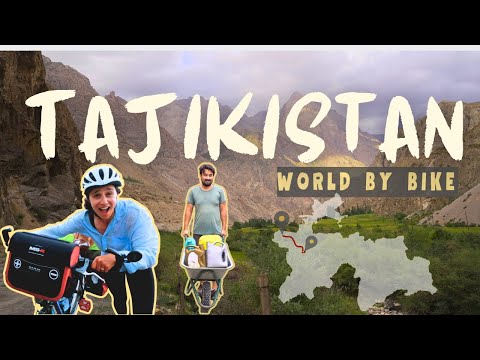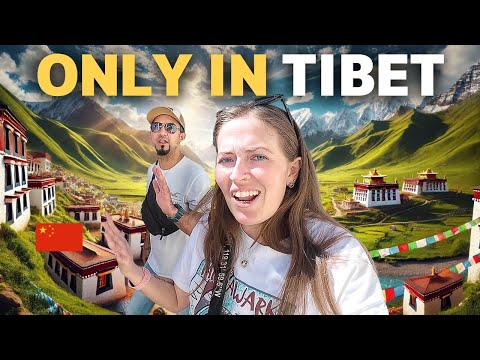Cycling Tajikistan is awesome | Exploring the local life #35

We’re closing in on the Tajik border, Panjakent border crossing. We have a 60 days e-visa, to have enough time for the Pamir Highway. Officially known as M41, it is the 2nd highest and probably most remote international road, winding through the rugged landscapes of the Pamir Mountains. Bike touring the famous Pamir Highway had become our dream soon after the idea of cycling around the world popped into our heads a few years back. We are in Tajikistan. We made it over the border. It was a quick process, not like one could think when you read the reports on the internet. 20 to 25 minutes, straight forward.
We need to go to Panjakent, the next town, maybe 15 kms in this direction. There we want to buy a SIM-card and before that we obviously want to get some money from the ATM. So let’s go! Heading east, Dushanbe, the capital of Tajikistan, will be our official starting point of the legendary M41. Since the fall of the Soviet Union it has become a favourite challenge for cyclists from all over the world. From the Uzbek border it is another 300 kms to the capital. So, the next few days we can get a proper feel for country number 12 on our journey.
So, Tajik roads… Quiet, quiet…fairly quiet! But a lot of cows are hanging out here and some kids are joining the bike tour. Hello! How are you? Hello! What’s your name? What is your name? Ok! Bye bye! This is pretty much the first village in Tajikistan. All of the people we meet are very friendly and curious. Everybody wants to say hello. And because Arev can speak Russian, they can actually get some information from us, which is not the case very often when they see tourists from other countries. Like my home-country Tajikistan has also been part of the Soviet Union.
While the older people are usually able to speak Russian as a second language, Tajik belongs to the Persian language family. It is very similar to Farsi, except that it is written in Cyrillic script. Arev is in the Megafon store. Apparently this one has the best coverage on the Pamir.
At best that really means barely any coverage in the Pamirs. For 100 Somoni I will get 10GB of Internet and unlimited access to all social media apps except Youtube. Rahmat. *Thanks in Tajik Do you speak Russian? "You speak", Facebook... There is a connection.
He's inviting us to his place. He did his military service in Armenia, in Yerevan. “Good, brother” *Armenian. Safe journey! So long! Second SIM Card. Now we also bought a Tcell SIM Card, because you never know.
It might be better to get reception in the mountains if we have two different providers. We’ll see about that when we are in the Pamirs. Now we have to find a place to sleep. Arev is very tired. I’m also a little tired and I smell horrible. Passing the mosque of Panjakent we are reminded that Tajikistan's main religion is, like in the other -stan countries, Islam. Tired, but also eager to experience new things, we ask if we can sleep at the local mosque, but we have to wait for the Imam to decide. However...
It’s not even 1 km. It’s not far. We can wait. It’s only 20 minutes. No, I’m inviting you to my home. I am the owner of my home, I’ll take you as guests. I have a family, children, wife, daughter- in-law, and you will get a separate place.
You can rest. You don’t need a tent. We don’t want to bother you. No, let’s go! He is inviting us over… Are you ok with this? Yeah, sure, why not?! Then we will be invited by the first Tajik family in Tajikistan. Ok, let’s go! Bye guys. Bye bye!
Wow! I wanted to buy a watermelon, Vahid said he has watermelon at home, but the seller said “no, no, I have to give you a watermelon”, well… Hello! Our first river crossing in Tajikistan. Immediately we are being introduced to Tajik hospitality. Homemade compote. Hot water. Here is hot water for you. Let’s go. I didn't understand anything. Is this for the shower?
You are going to take a shower. Go! I’m so tired. After a very comfortable night we start early in the morning.
For now we'll be following the Zarafshan River, the spreader of gold, up the mountains. Is this drinking water? Yes. With the exception of neighbouring Afghanistan, Tajikistan is the poorest of the -stan countries. That is, at least in part, due to the extreme terrain. Home to some of the world’s tallest and most dramatic mountain ranges, including the Pamir and Alay Mountains, approximately 93% of Tajikistan is mountainous, with over 1000 peaks exceeding 4,000 metres above sea level. What happened to the good weather?! It happened so suddenly.
Everything is homemade here. Butter - homemade, from their own milk. This is “smetana”, homemade. I don’t even know what that is. But it's tasty. We don’t even know what’s happening here.
This is Tajik Plov. They have eaten already, so they just put all of this stuff here for us. We can’t eat it all, but we will try. As they invite us to stay the night, we take the chance to explore proper Tajik country life.
Like in many parts of Tajikistan none of the buildings in this village has a water connection, hence getting water is part of the daily chores. The water flows from the big mountains over there. There are three water points. One is here, there is another one, look.
There is another one over there. How many families do live in this village? 150. I think... Where are you from? His dad is from Germany, and mom from South Korea. From Korea… That’s why he has a tattoo… Yeah… Do you live together? We are a couple. Ah, understood.
We travel together. On our bicycles. You come from there, yes? Yes, from Germany on bicycles.
Oy, oy, such a long journey. How many kilometres from here? Does that thing show the kilometres? Yes, 9600 kms. From there to here shows your speedometer.
Yes. Hello! The water was scooped up and hosed down here from 5 kilometres over there. Who did it? You? No, the whole village.
My grandfather organised that work. It’s bad that there is no water. Careful, careful! This is a "Schubkarre" in German. "Schubkarre"... Fortunately they were closed. We brought most of the water.
For you! Thank you! I have a rose. Very nice! Later that afternoon the younger sister wants to show me something. She is a bit shy, especially in front of the camera. As we understand it, being filmed is deemed sort of inappropriate for women, if they are not yet married.
Very beautiful! *Russian What? *Tajik Very beautiful! *Persian Traditional Tajik working dress. Nigina made it herself. We get between 6-8 litres of milk each morning and evening. Salom! Germany! Hello! Thanks! We can’t grasp what it is exactly at that moment, but our hearts are filled with joy. What a beautiful day! We are slowly gaining altitude following the river upstream. The spreader of gold. It seems like it spread most of it into the hearts of the locals.
The sun is glaring, the landscape has a beautiful rugged charm, the road is smooth with a gentle gradient and has barely any traffic. What more could we wish for? Do you speak Farsi? *in Persian Persian? Tajik! Tajik! Good bye! *in Persian When I was in school I learned a little English. *Russian I get up at 7 o’clock. I do my morning exercise. I am family.
Very good! Thank you! Have a nice day! Brother, my name is Rakhmonov. Rakhmonov? Mathias! Thank you! Bye! Car-good! I think that correlates: they have German cars, they love German people. Oh, I can smell food! Yoo-hoo... A horse meat special for the Pamirs. By the end of day the valley is getting narrower and steeper.
From the main road we spot this green and flat area. Where are you coming from? *Russian We started the tour in Germany. Is this your husband? Yes, we are married. Your husband?! Husband! Do you have kids? Kids? No, no. This is a beautiful garden.
A fruit garden, really… I think they have apricots. It’s perfect for us, for our tent. We’ll sleep here very well. Tomorrow we have to make an important decision about our route.
For now though we can enjoy a peaceful night in this beautiful orchard. To get to Dushanbe we must cross to the southern side of the Hisar Range in the western part of the Pamir-Alay system. There is a 5 km long tunnel, infamous for its poor ventilation, lack of lighting, and overall dangerous conditions, which gave it the ominous nickname 'Tunnel of Death'.
Cyclists who actually value their lives hitchhike through it on the back of a lorry and eventually emerge on the other side with a blackened face. However, at least in theory there is another option: the old road leading over Anzob pass. As our maps show it as closed, Arev uses her language skills to ask the locals what they think.
You want to go over the pass? Yes, over the Anzob pass. It will be very difficult. But is it possible? Yes, yes…it’s possible.
It is possible to go, but it is rocky… It's bumpy... The road has not been maintained for a long time. That’s fine, but are there any animals there? Bears, wolves. It is possible that there are… Honestly, it’s possible. We don’t know for sure, maybe there are wolves...
But are there people living in the Anzob village? Yes, yes, people live there. Join us again should there be another episode. Instead of waiting, you can also watch how we got here with the playlist linked below! To significantly heighten our regard for our lives, press that like button, share the video with people who might like it too, and, of course, let us know what you think in the comments below! For example, which way would you choose to go? Or if that's too dark, just write “best video ever!” In any case, ride safely, and may the wind be in your back!
2024-11-07 14:41

